Massachusetts
If I had to choose a moment to remember from the last weekend of racing at Suffolk Downs what would it be? It could be T.D. Thornton’s final call:
“They approach the quarter pole in the grand finale and they turn into the Suffolk Downs homestretch for the final time … 84 years of history behind them, half a furlong to the finish, and it’s all Catauga County, by seven on the line. Admiration was second, Shiloh Lane was third. Wow! What a long run it’s been, what a wild ride since 1935. Thanks, Suffolk Downs, for a lifetime of great memories!”
It could be paddock analyst Jessica Paquette’s heartfelt goodbye from the scale house roof before the horses left the paddock for the last time.
Or it could be the thunderstorm on Saturday that left the lights flickering in the grandstand and forced the cancellation of the last three races scheduled that day, including the $100,000 James B. Moseley Stakes — which, had it happened, would have honored the man who led the revival of the track in 1992 from a two-year shuttering. In the post-mortem, let it be noted that in its last days, the track remembered its history, recent and long past.
It could be the unexpected sight of a memorial near the winner’s circle, three people standing at the rail, a man shaking out ashes from a bag into the track’s dirt before they crossed themselves and prayed.
Or maybe the woman who, picking her way through puddles, sandals dangling from her hand, cried, “This is the last time I’ll walk barefoot across this track!” As if it were something she did many times. And who knows? Maybe she did. A lot can happen in 84 years, and a lot happened at Suffolk Downs. Tom Smith discovered Seabiscuit. Bill Mott brought Cigar to Boston to win the Mass Cap in 1995 and 1996. Waquoit made his hometown proud in the 1987 Mass Cap.
Those are the high points. Everyone knows them. Most of what happened at Suffolk Downs happened out of the spotlight — it happened to the families who bred and trained horses and worked the grandstand and the backstretch for generations. It happened to the women who wanted to be jockeys and found a track where they could get a foothold. It happened to the kid who came to the track with his dad and then snuck in as a teenager and then made a career in the game. It happened to the young-ish woman who went to Suffolk one day and found the beauty and meaning that so many had before in horses and handicapping. (Am I getting weepy right now? I might be.)
But the moment that I might choose would be the sound of the crowd cheering when the field for the fifth race on Sunday went to the gate after another storm delay. The rain might have chased some people away, but most of the crowd jammed into the grandstand seats and waited out the downpour. They roared and clapped and whooped when the bugle sounded and the horses began to leave the paddock. For a second, the grandstand was a wall of sound, what it was when I went to my first Mass Cap in 2004 and Offlee Wild nipped Funny Cide for the win, what it must have been for so many races before.
It was the sound of people at the track, happy to be there.
Photos from the final weekend at Suffolk Downs:
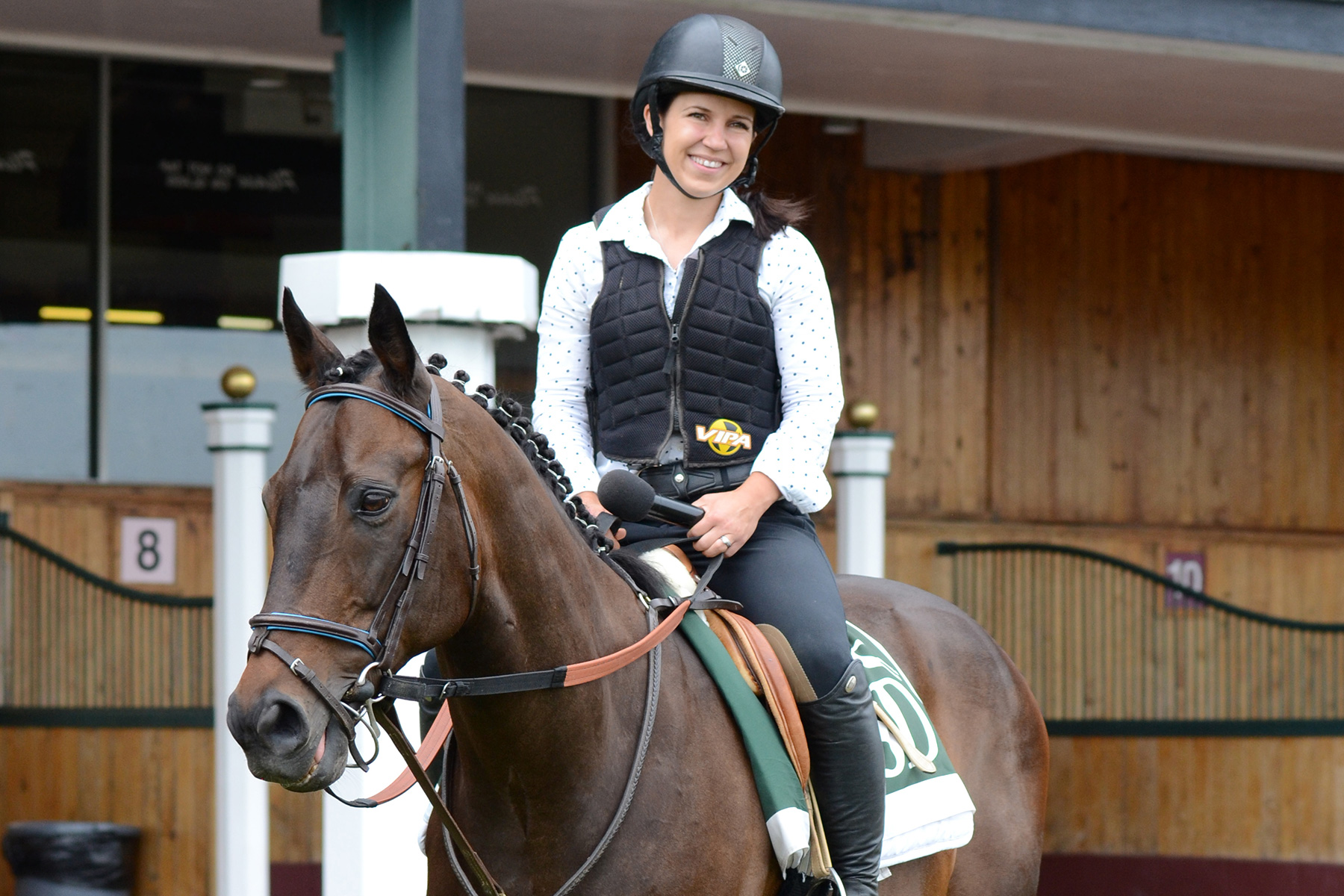
A dream comes true for Jessica Paquette, who rode New England champion — and very good pony — Mr. Meso into the paddock on Saturday and delivered her analysis of the day’s first race from the saddle.
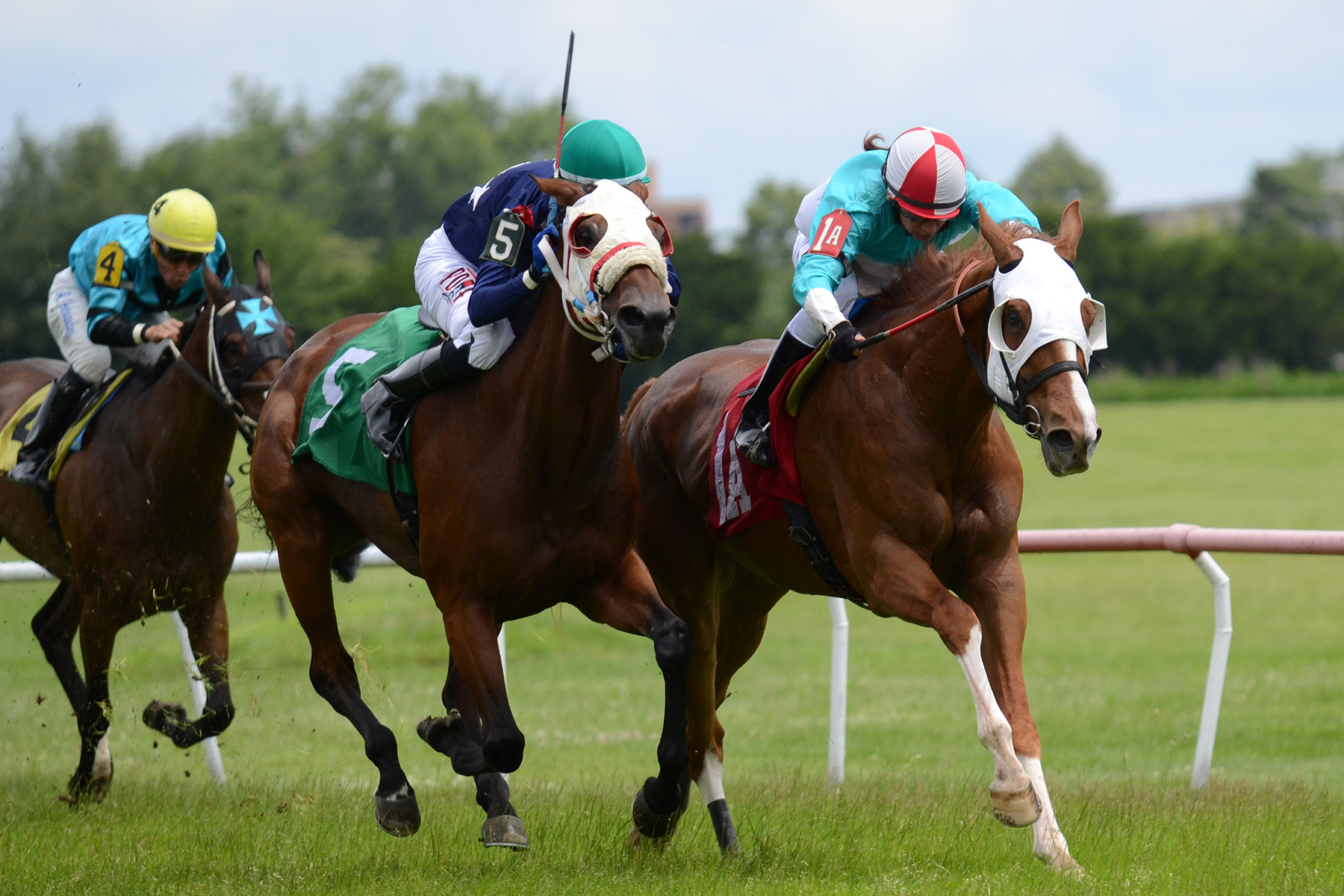
Tammi Piermarini and Saint Alfred (inside) outrun Luis Quinones and Desert Dotty to win the Thomas F. Moran Stakes for Massachusetts-breds on Sunday.
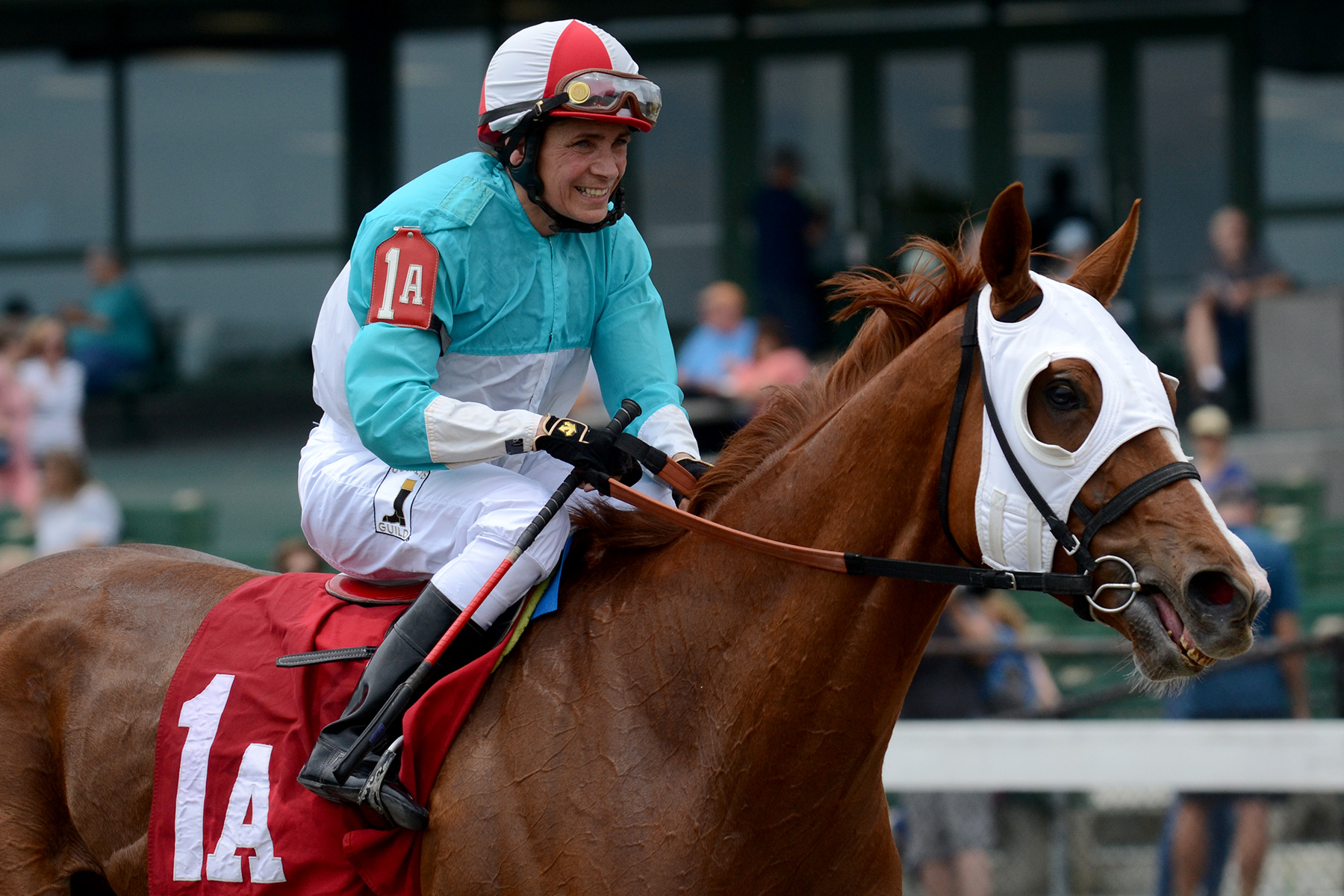
Piermarini and Saint Alfred galloping back after winning the Moran. At the end of Suffolk’s six-day meet, Piermarini topped the track’s jockey standings once again (and for the last time), with 10 wins and $347,650 in earnings.
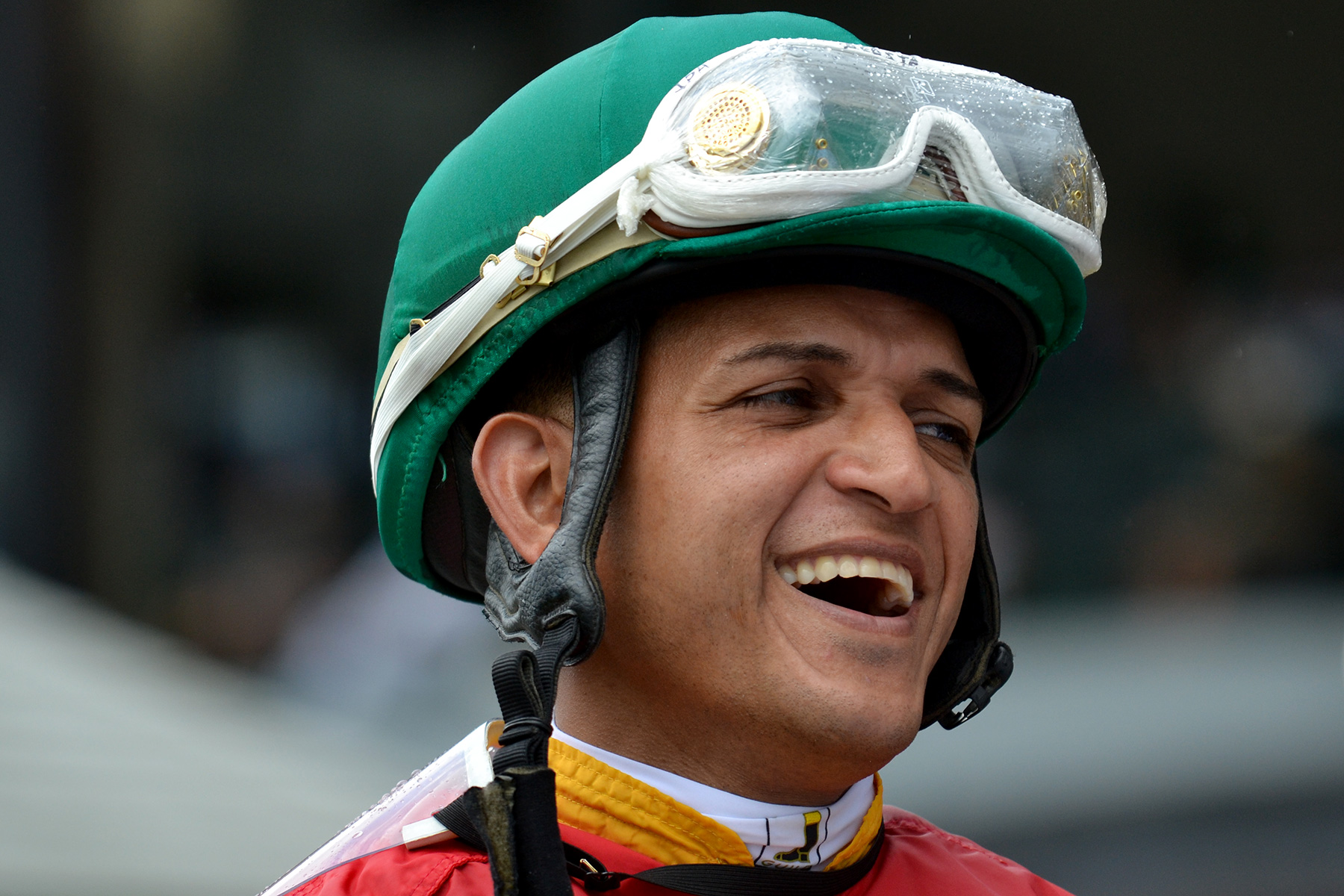
J.D. Acosta, second in the standings with eight wins and earnings of $317,550.

The crowd on the grandstand rail. An estimated 12,311 attended the races on Sunday; the figure for both days was estimated at more than 21,000.
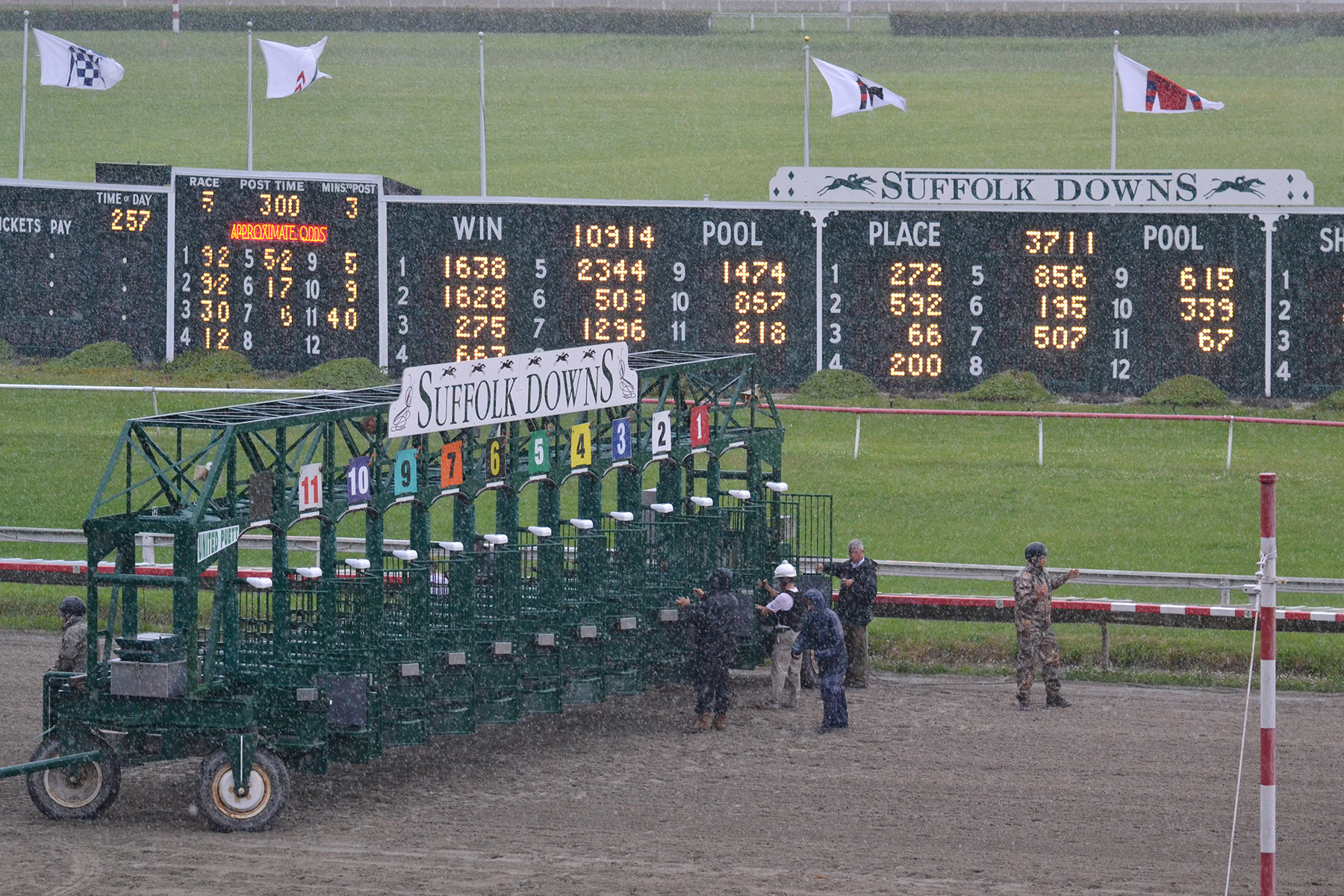
A thunderstorm delayed the start of the fifth race on Sunday.
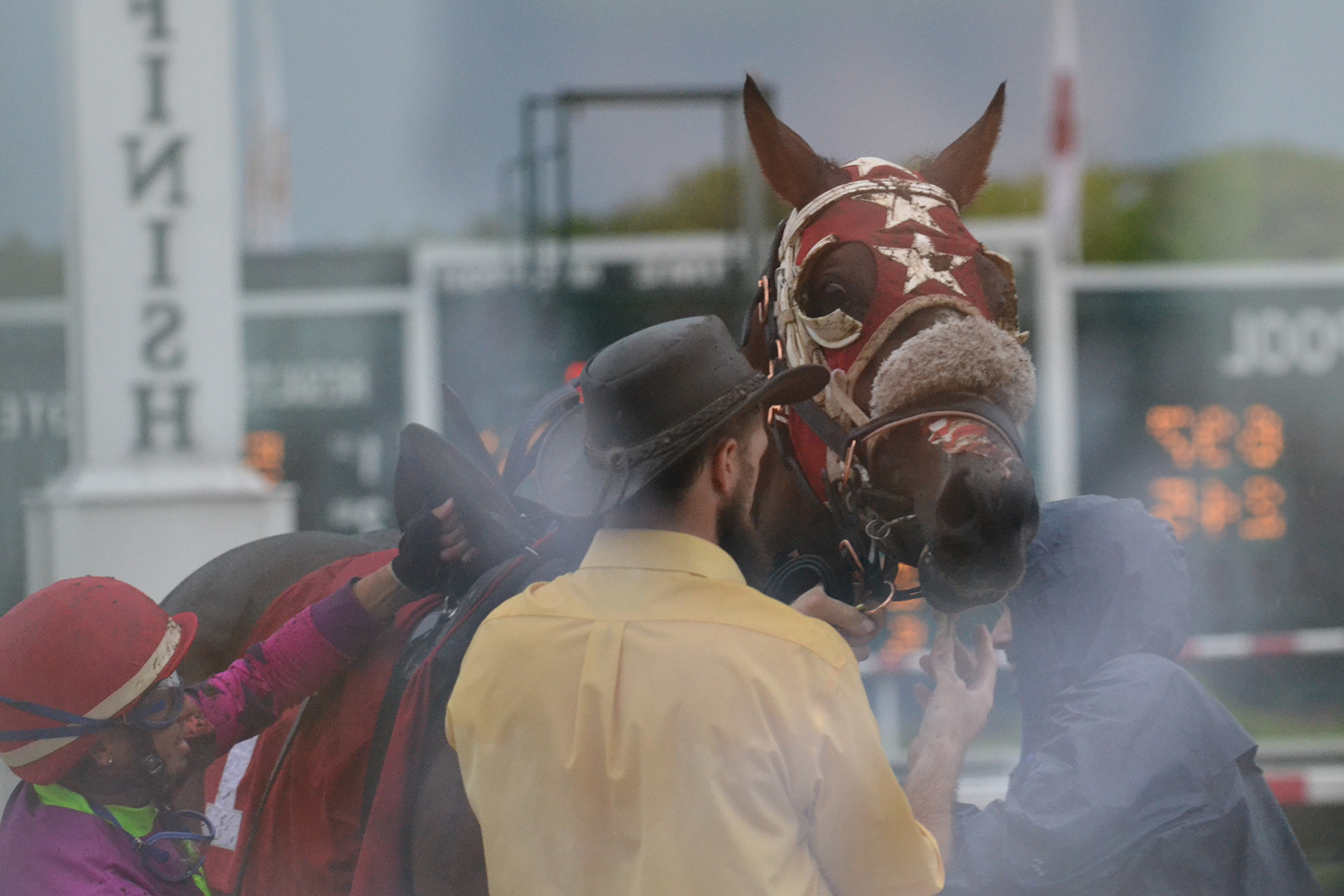
A reflection in the scale house window of a horse being unsaddled.

The Sunday crowd along the clubhouse rail.

Dirt flies up as the field for race 10 on Sunday — the final race — runs past the finish line for the first time and toward the clubhouse turn.
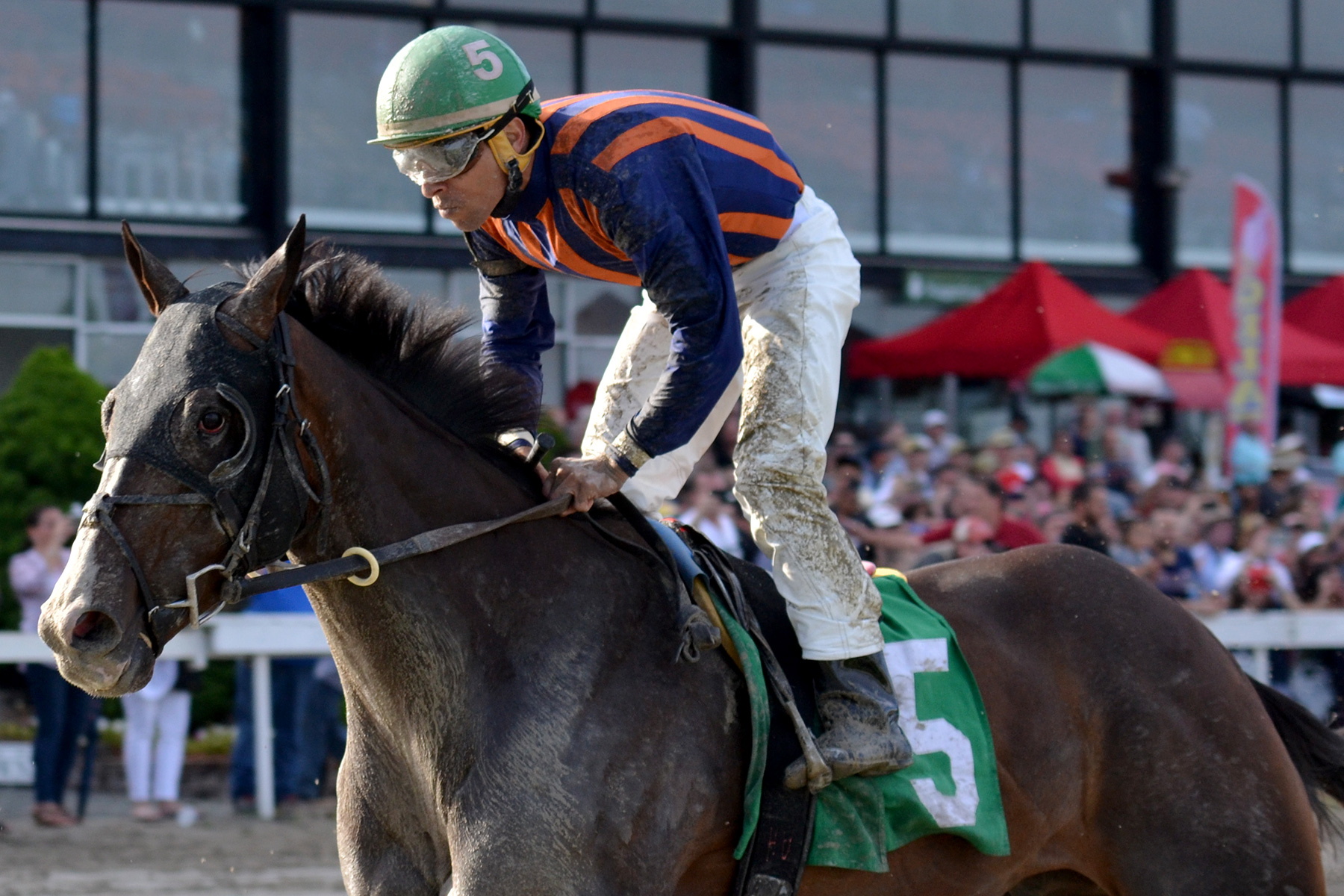
Maiden no more, and now a name for racing history: Catauga County, with rider Andy Hernandez Sanchez, wins the last race at Suffolk Downs.
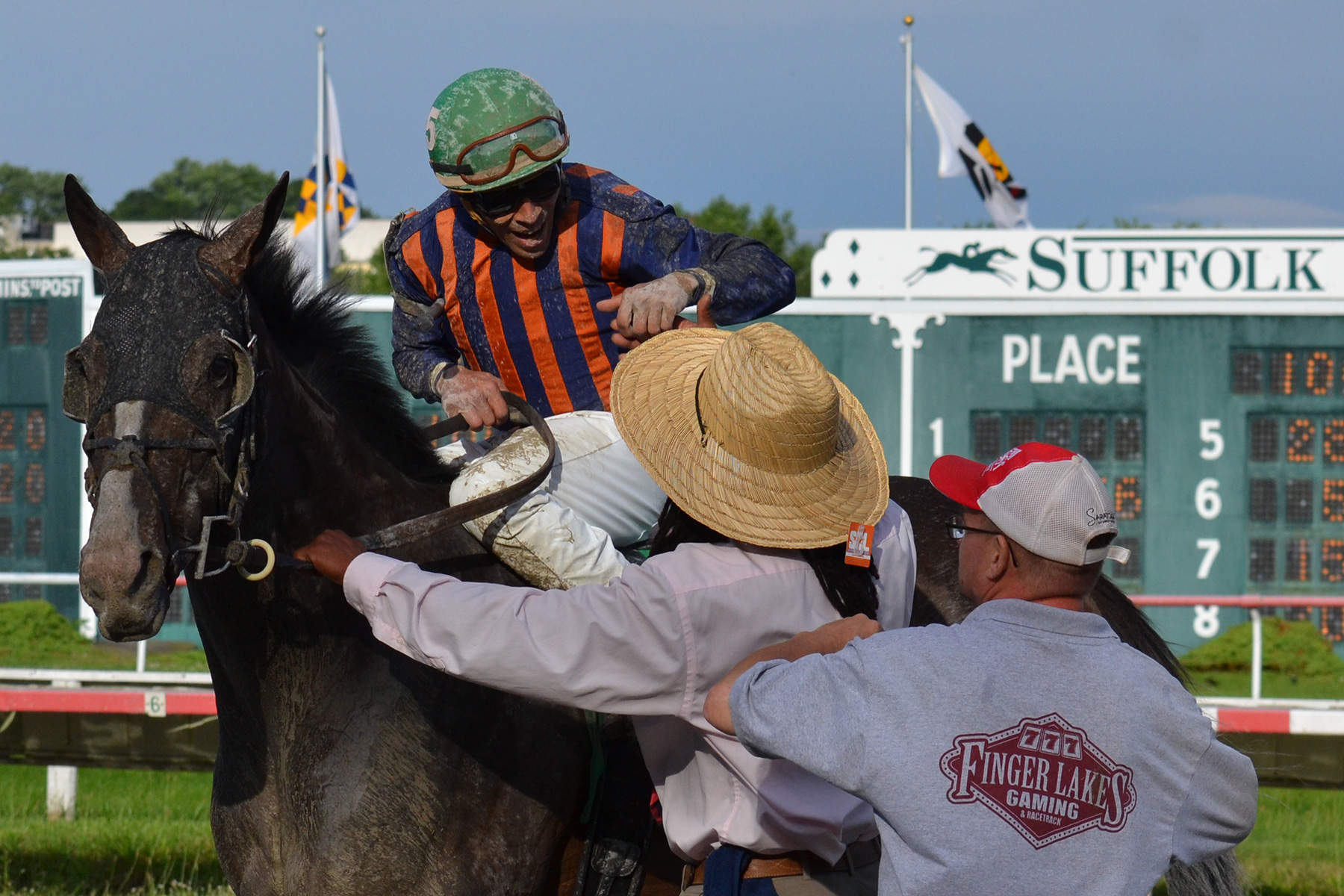
Catauga County returns to the winner’s circle for trainer Neil Morris and owner PathFinder Racing. The 4-year-old Violence gelding paid $5.60 to win.
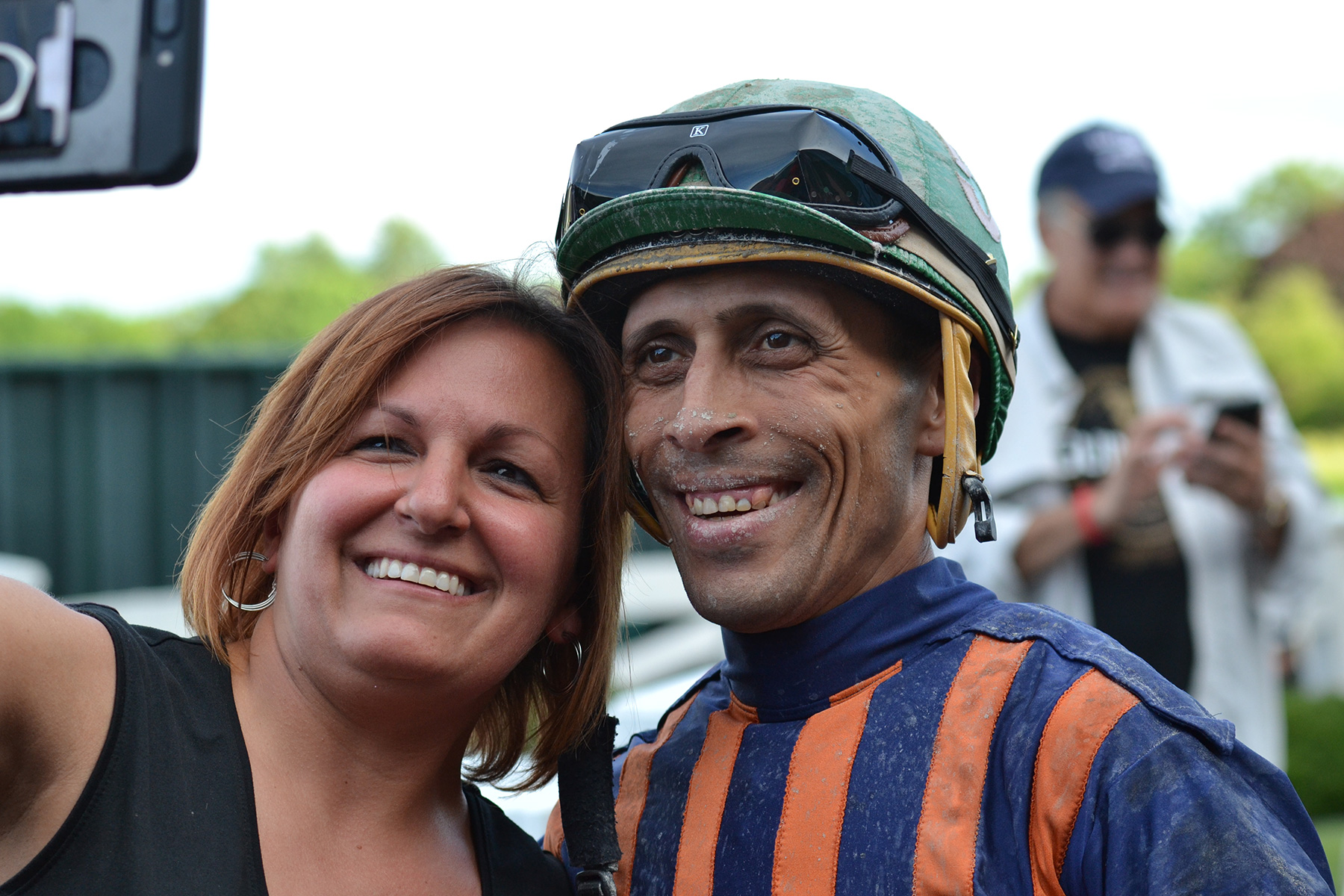
Signing autographs, taking selfies: Hernandez Sanchez finds himself popular with the Suffolk fans after winning the track’s last race.
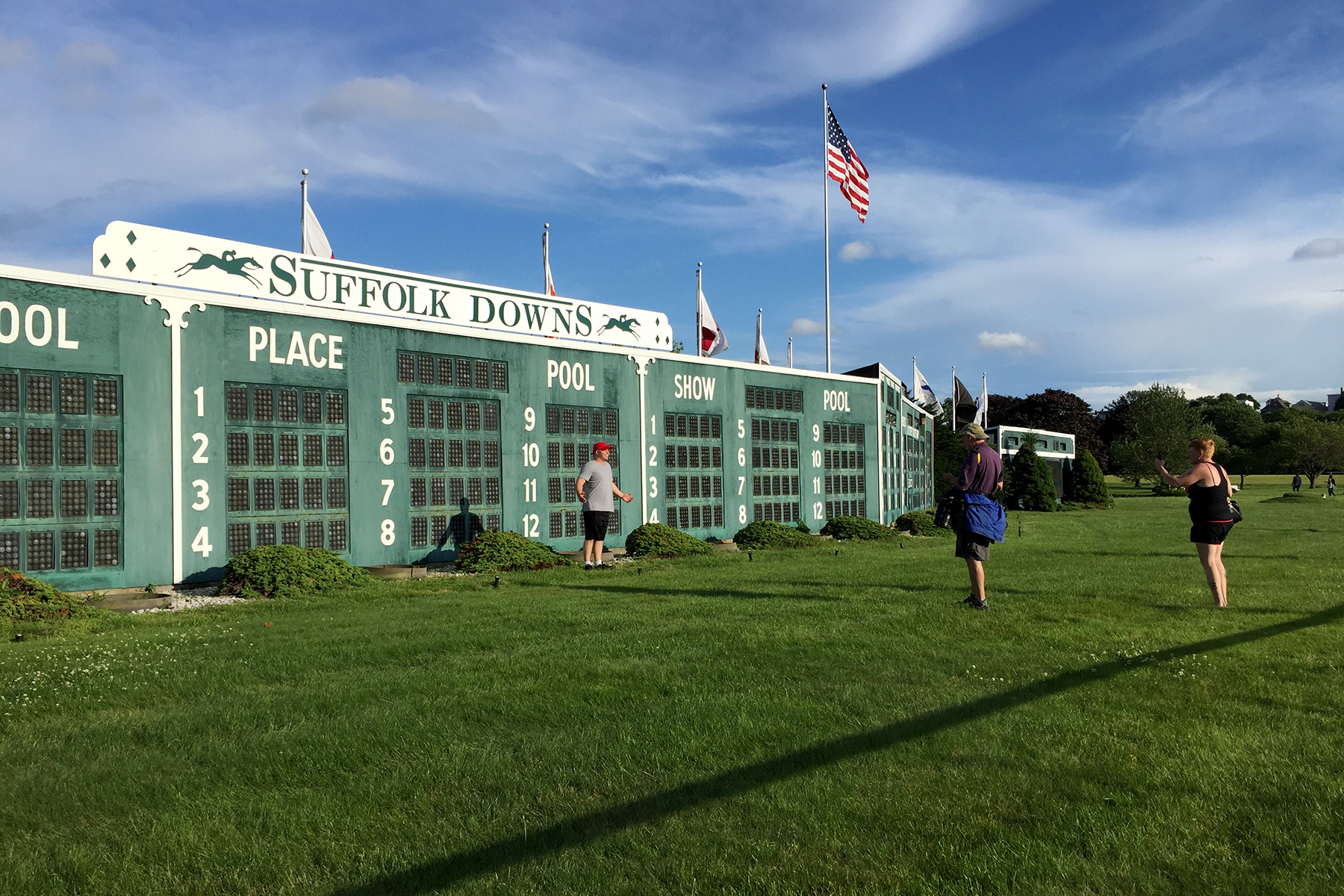
People walked across the track after racing was done to take photos — and to get their photos taken in front of the infield tote board.
More details from Thursday’s New England HBPA horse park presentation:
Brad Boaz, of the Lexington, Kentucky-based architectural and engineering firm CMW, gave an overview of the “Massachusetts Horse Park†master plan, as well as presented some hard numbers, during a press conference Thursday in Boston.
“Keeping the horse in mind is paramount, but also for the patron as well,†Mr. Boaz said. “We want to keep them coming back.â€
The horse park, proposed by the New England Horsemen’s Benevolent and Protective Association, would be at least 200 acres and feature a horseracing complex, an “agri-tourism village†and equestrian venues …
“We don’t feel like it’s this massive structure. It’s very quaint. It’s very inviting,†Mr. Boaz said. “What we’re trying to do is take little features from some of our most favorite tracks.â€
Saratoga was apparently cited as a model.
The State House News Service reported on Tuesday that a section of the 2018 budget proposal in the Massachusetts state senate would sweep $15 million from the Race Horse Development Fund into the state general fund:
“It’s just been sitting there,” Senate Ways and Means Chairwoman Karen Spilka said of the Race Horse Development Fund money Tuesday. “That’s where we give some of the increases to (the Department of Environmental Protection) and (the Department of Conservation and Recreation). We use it for conservation and recreation, consistent with the original purpose.”
“Much of the fund’s assets have remained unused, and given the state’s tight fiscal situation, we direct the money to protect and enhance our natural resources for the benefit of residents across Massachusetts.”
This development is no surprise. With Thoroughbred racing scheduled for six days this year and the recent sale of Suffolk Downs putting a likely end to any racing after 2018, there’s a growing pool of money in the RHDF with nowhere to go. The fund, collecting 9% of the slots revenue at Plainridge, had a balance of approximately $15.6 million through April. Last month, a Boston Globe editorial called for a new mission for the RHDF millions:
When the casino law was passed, allies of the racing industry tried to spin the fund as something other than a special-interest giveaway by claiming it served the broader public interest in preserving open space on horse farms.
If preservation is really Beacon Hill’s concern, though, it would make more sense to follow the suggestion of State Representative Bradley H. Jones, a Republican from North Reading, who last year proposed redirecting some of the horse racing money into community preservation funding for municipalities. Community Preservation Act money can be used for open space, affordable housing, and historic preservation; local dollars are supposed to be matched with state money, but the state’s contribution has been declining in recent years and will be stretched even thinner now that Boston voted to join the program …
Jones’s proposal would be a step in the right direction, but the state’s ultimate goal should be to wean horse racing off state support completely. The collapse of horse racing has inflicted undeniable pain on many workers in Massachusetts, and they deserve the Commonwealth’s full support making a transition to more viable jobs. But simply paying them to run horses in front of ever-shrinking crowds — at Suffolk Downs, in New York, or anywhere else — is not a long-term economic policy.
A review of the fund’s work by The Eye and WBUR public radio has found scant gains in breeding race horses, a schedule of racing that continues to be limited, and growing infighting among industry factions that has tried the patience of the fund’s overseers.
And I wrote in 2014 that the legislature would come for the RHDF.
Much like last year’s revised split that increased standardbreds’ share of the RHDF from 25% to 55% — Plainridge is running 125 days with average daily purses of $60K and a $250,000 stakes race in 2017 thanks to the boost — the proposed appropriation in the 2018 budget bill is being sold as a temporary way to put the fund to use — it’s for one fiscal year only — except that legislators, whether or not the budget passes as currently written, aren’t likely to forget that the RHDF money is there. The fund will become an even more tempting target for raids when the Springfield MGM casino opens in 2018 and a percent of its revenue begins to swell the RHDF.
New England HBPA executives promise to fight the proposed appropriation:
The New England Horsemen’s Benevolent and Protective Association, for example, makes the case that the money in the fund was intended to promote horse racing. What better way to promote horse racing than to promote a horse park with a track, officials said.
“When we look at that money in the Horse Race Development Fund, we see 1,000 jobs and the preservation of open space,†said Paul Umbrello, executive director of the horsemen’s association. “We will fight the transfer.â€
The NEHBPA continues to push their horse park plan; they propose to build a new racetrack and equestrian center in Spencer, a small town in central Massachusetts that’s off the Mass Pike but more than an hour from Boston. It’s a longshot. The Boston Herald blasted the plan a few weeks ago:
Now, silly us for raising a question like this, but if Suffolk Downs couldn’t make a go of thoroughbred racing a stone’s throw from downtown Boston, why on earth would the state want to invest its money in such a venture, say in maybe a town like Spencer?
It was, after all, Sen. Anne Gobi (D-Spencer) who filed a bill to divert money from the fund to a horse race park, while acknowledging that the racing industry is “on life support.â€
“This is an opportunity to support the entire industry,†she added. “We have to do something because it’s going and once it’s gone it’s not coming back.â€
And calling horse racing an “industry†does not make it so.
“We just want to say we want to take X percentage of that fund to build and support, as a bridge gap, the horse park,†Umbrello said. “Once we’re up and running it’s going to be self-sufficient.â€
Like we’ve never heard that one before!
Until lawmakers find a better use for the racing fund it will continue to attract nutty schemes like this one.
(My initial reaction to the NEHBPA plan when it was laid out last summer.)
The Massachusetts Gaming Commission declined to comment earlier this week, but chairman Stephen Crosby told the Globe last month that while:
he supported legislation that would reform the horse racing industry and give it a better chance of success in Massachusetts … taking away the fund would be the “death knell†for racing in the Commonwealth.
The death knell is sounding — the obstacles to the NEHBPA horse park are substantial, Brockton is not viable, and the state of the larger racing industry is against new construction or a new track operator entering Massachusetts.
8:00 PM Addendum: The NEHBPA pitched the horse park to reporters in an event this afternoon, Bruce Mohl reports in CommonWealth:
Brian Hickey, the association’s lobbyist and the host of Thursday’s presentation, said the group would like to see the law changed so the money in the Horse Race Development Fund could be used to directly support the state’s horse-racing industry. He estimated a couple hundred thousand dollars would be needed for the horse park feasibility study, and indicated more of the money would be needed if the horse park itself moves forward. He said revenues from simulcasting races from around the country could also be used to support the park.
More to come …
Copyright © 2000-2023 by Jessica Chapel. All rights reserved.